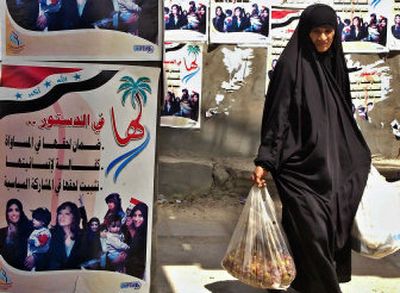Leaders put off key vote

BAGHDAD, Iraq – In another dramatic last-minute standoff, Iraqi leaders put off a vote on a draft constitution Monday, adjourning parliament at a midnight deadline in a bid for three more days to win over the Sunni Arab minority whose support is key to stopping the insurgency.
The Shiite-Kurdish bloc that submitted the draft constitution expressed optimism that a deal was still possible. But top Sunni Arab leaders said flatly that compromise was far off.
U.S. Ambassador Zalmay Khalilzad said the three major issues blocking a deal were federalism, purging Saddam Hussein’s Baath Party and whether some of the officers of the assembly should be elected by a majority or two-thirds vote.
The Shiite-Kurdish draft would fundamentally transform Iraq from the highly centralized state under Saddam into a loose federation of Kurds, Shiites and Sunni Arabs. The Sunnis – who dominated Iraqi society under Saddam – oppose that decentralization, fearing it would cut them out of the country’s oil wealth, lead to the breakup of the state and leave them powerless.
Saleh al-Mutlaq, one of four top Sunni Arab negotiators, said more than 20 issues still divide the sides. Apart from federalism and power-sharing, he cited how the constitution spoke of Iraq’s national identity as “part of the Islamic world” rather than the Arab world – a concession to the non-Arab Kurds.
“This constitution is full of land mines that would explode on Iraqis. This constitution will divide the country,” al-Mutlaq said.
In an interview late Monday, Tariq al-Hasjimi, secretary-general of the country’s largest Sunni political organization, the Iraqi Islamic Party, said his group had “reservations on some articles,” including federalism.
“Federalism should be only for Kurdistan in order to keep Iraqi unity,” he said. Al-Hasjimi said his party, which has roots in the fundamentalist Muslim Brotherhood, also objected to concessions made to secular Iraqis.
The numerous remaining issues referred to by al-Mutlaq and other Sunnis cast doubt on whether the Iraqis would be able to finish the document within a few days since the various groups have widely differing positions. The repeated delays are a deep embarrassment for the Bush administration at a time of growing misgivings within the United States over the mission in Iraq.
The U.S. military said three U.S. soldiers were killed Monday – two from Task Force Liberty by a roadside bomb north of Baghdad, and one from Task Force Baghdad during a rocket attack in a southern district of the capital. Two more soldiers died Sunday when their vehicle overturned during a military operation near Tal Afar. At least 1,871 U.S. troops have died since the Iraq war started in 2003, according to an Associated Press count.
Secretary of State Condoleezza Rice praised the efforts of the drafting committee, noting that “step by step, the Iraqi people are charting their own path toward a shared future of freedom.”
But Washington had applied enormous pressure on the Iraqis to meet the original Aug. 15 deadline but parliament instead had to grant a week’s extension, which they again failed to meet.
In a concession to secular-minded Iraqis, the draft declares that Islam is “a main source” of legislation, not “the” main one as initially pushed by religious parties. The charter states that no law may contradict Islamic and democratic standards or “the essential rights and freedoms mentioned in this constitution.”
The proposed constitution “guarantees the Islamic identity of the Iraqi people” but also “guarantees all religious rights” and states that all Iraqis “are free within their ideology and the practice of their ideological practices.”
Khalilzad, who previously served as the top American envoy to Afghanistan, told CNN that the banning of any laws that are against the provisions of Islam is “what the constitution of Afghanistan stated and … many progressive Islamic countries state.”
The text also declares both Arabic and Kurdish as official languages, bringing Kurdish to an equal status nationwide.
The Shiite-Kurdish faction finished the draft on Monday and formally submitted it to parliament as the lawmakers convened minutes before a midnight deadline. The negotiators quickly deferred a vote on the draft because of the fierce Sunni Arab resistance.
The 15 Sunni Arab members of the drafting committee issued a statement early Tuesday saying they had rejected the constitution because the government and the committee did not abide by an agreement for consensus.
“We reject the draft constitution that was submitted because we did not have an accord on it,” said Sunni delegate Nasser al-Janabi.